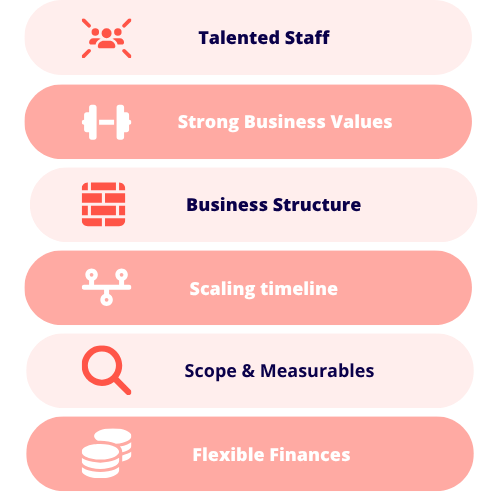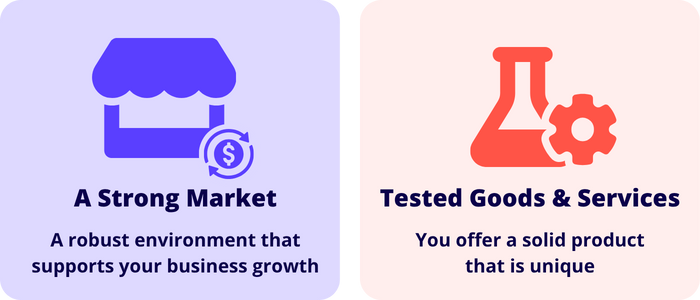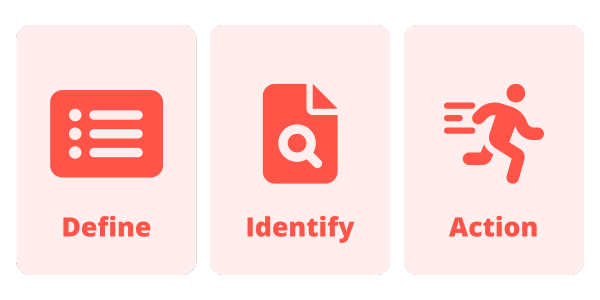There comes a point when your business outgrows itself and transitions from small to larger. This is a critical time for businesses, as every decision counts during this phase and can be the difference between success and failure. Scaling your business to become something else is challenging, but it can be done, as evidenced by countless businesses that have grown into large, successful companies. So, how can you scale your business successfully?
Let’s dive into what scaling is, the essential concepts, and what to do when you and your small business are ready for the next step.
What is scaling?
Scaling is an economic concept where a business ‘upgrades’ into a larger structure or enterprise. This includes increasing their output of goods or services, expanding their employee headcount, restructuring their business operations, and entering new markets. Scaling occurs when a business’s size can’t keep up with demand.
Example
A small bakery that specialises in croissants can’t keep up with demand and sells out by 10 am every day. After surveying customers, the bakery found that people were travelling from neighbouring suburbs to buy their croissants.
With this information, the bakery owner secured a business loan to lease a small kitchen, enabling them to produce more croissants to meet demand. The business now generates more revenue, and with sales on the rise, the bakery owner plans to open another location in adjacent suburbs.
Scaling is the process of how a business that has outgrown its current operations transitions to a larger enterprise. In our example, the bakery initiates this by securing a loan to increase production. However, this is just a simple example; there is much more involved when pulling off a successful business upscale.
Scaling checklist for success
Scaling your business is complicated. Before you start, identify the key factors, conditions, and plans that will make scaling easier for your business.
Scaling essentials

Talented Staff
Hiring talented new workers is essential to any scaling project. You need to look for people who will go above and beyond for you. When scaling, you need to rely on more than just the task at hand; you require different perspectives and intangible qualities that will make your business better. Focus on talent rather than finding someone to do the work.
Business values
Fine-tune your business values. Why did you start your business, and what is your business’s purpose? Part of identifying your values is having an easily articulated business vision and goal. Your business values don’t have to be complicated; they only need to be recognisable and accessible.
Take, for instance, our bakery example. The bakery owner takes pride in the quality of their croissant; they do not compromise on quality, ever. So, when they scale, they invest in people, equipment, and facilities that can continue to deliver the best croissants.
Whatever your business values are, they need to be nonnegotiable so there is no need for organisational conflicts regarding company vision.
Business structure
As your business grows, so should the number of decision makers. You can’t be involved in every decision, and you need reliable leadership to develop your staff and lead effectively. This ties into staffing, and where talent is a must-have.
Let’s break this down so you can easily apply it to your business structure:
- Add talented staff to leadership positions.
- The leadership team steers the business in the direction of your vision and values.
- New and existing staff are developed by the leadership team.
- Business is sustained by effective leadership and talented staff.
Scaling timeline
When you first start a small business, setting up and becoming profitable is a multi-year process — a path that often comes with significant challenges. But when a company no longer meets the demand of its customers and needs to scale, it should seize the opportunity to increase profitability and grow before that opportunity is lost.
When opportunities arise, you need to know whether you have the right systems and processes in place to take advantage of them. Do you have accounting and payroll software to streamline and analyse your finances? Do you have a website for customer traffic? Do you have industry-specific tools that increase productivity? If you don’t have the right processes in place, add them as part of your scope and timeline.
Scaling scope
Scope is where you work out exactly what needs to be done, why, and how to achieve it. By scoping your scaling requirements, you have an action plan to follow.
Take a look at our bakery. The owner identified a problem: they were selling out of croissants too quickly. What did they need to do? They needed to increase their output. Why? To meet demand. How? By getting a loan to lease out a new space to bake more croissants. The new space is the “scope” of their scaling project.
These questions will help you refine your approach and steer your focus in the right direction.
Scaling finance
Scaling requires a significant amount of capital. New staff, locations, structures, operating systems, and equipment all require money. Unless you can fund it yourself through bootstrapping with high-margin products, you will need to secure capital from financial institutions or investors. This is where a business plan is particularly useful, since you can use it as a pitch document for banks or investors.
It is also wise to find new ways to make your business profitable and add to your structure. Relying on a single product to generate revenue is a recipe for failure, as markets and customer tastes constantly evolve. Tying back into our bakery example, the owner could generate additional revenue by offering catering solutions to other cafes and restaurants, thereby opening a wholesale department to their enterprise as they scale.
Scaling conditions

Before you scale your business, you need two things to be true:
- Robust market conditions. You need a large customer base with similar needs and spending habits that can support and sustain your revenue as you scale.
- Unique product and consistency. Your product or service must be consistent for every customer, while different to your competitors.
It may seem obvious to any business owner that you need the right market and right product to scale effectively, but sometimes people miss the obvious. For instance, you wouldn’t try to scale during a recession, nor when you haven’t exactly nailed the goods and services you provide.
Scaling action plan

Once you have established your scaling essentials and conditions, you can create your action plan. Your scaling action plan consists of three steps: defining your goals and objectives, identifying and resolving constraints, and taking action. Rinse and repeat. By following these steps, you work towards achieving a sustainable, long-term, and profitable business.
1. Define goals and objectives
Define your goals by determining what outcome you want to achieve by scaling your business. Once you’ve done that, set out the objectives to reach them. For example, our bakery needs to scale up to meet demand and capitalise on market opportunities. The owner has set a goal to increase their revenue tenfold (1000%) over 36 months. So what needs to be true to achieve this? Customer base, store locations, and production capacity. Constantly questioning your needs and how to meet them is part of your scaling equation.
2. Identify business constraints and solve
Successful businesses know their limitations and have repeatable and scalable solutions to address them. So, once you have identified your goals and objectives, figure out what might hold you back. Develop solutions for these problems and ensure they’re repeatable.
A great way to do this is to examine what has worked in the past for different companies. What solutions do other successful bakeries use to address their challenges? How did Baker’s Delight reduce its variable costs in production?
3. Action and repeat
Once you understand your goals, challenges, and potential solutions, you can put your plans into action. For any scaling endeavour to succeed, you need to be efficient and unified across your organisation. This can make your business better overall as you refine your operations.
Scaling your small business
Scaling can be just as challenging as starting up. However, it is also a natural part of maintaining a profitable business. You don’t have to become a multinational company; even small-scale upgrades can be worthwhile. Make sure you fully understand what is involved in scaling, and you won’t be overwhelmed from the start.
Part of successfully scaling is having the right systems in place. Accounting and payroll software provide a financial snapshot of your business, so you know what you need to do to scale your business and take it to the next level.
Need an accounting software to help scale your business? Reckon One was recently reviewed as the best value accounting software for small businesses!













































